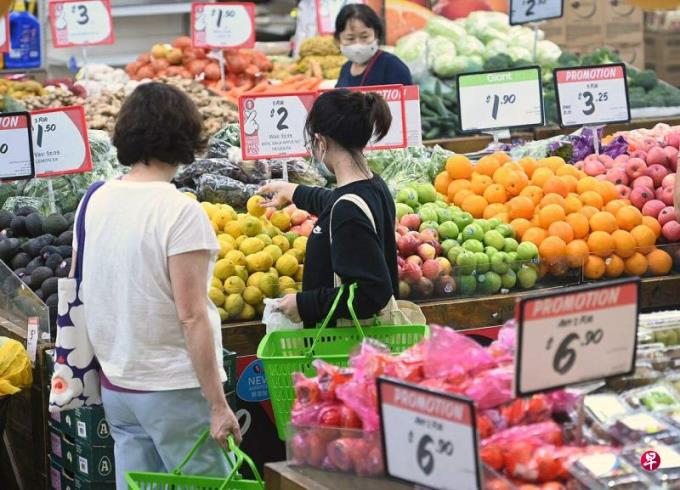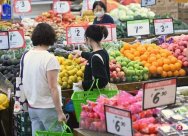
The inflation rate of Singapore in August slows down for four consecutive months, and the overall inflation rate has decreased from 4.1%in July to 4%.%,
The Singapore Financial Authority and the Ministry of Trade and Industry pointed out in the statement that global supply chain tensions have slowed down, and food prices are lower than a year ago.Although oil prices have risen since July, the inflation of Singapore's major trading partners has gradually eased.Import costs are lower than a year ago, and the current tightness of the local labor market is eased. Core inflation is expected to slow down in the next few months.
Official predictions that the overall inflation rate this year is from 4.5%to 5.5%, while the core inflation rate is from 3.5%to 4.5%, which is lower than the 6.1%and 4.1%of last year.
In addition to the above reasons, the inflation rate was high last year, and the HKMA's five -degree appreciation and suppression of the entry costs also prompted the growth rate of inflation.Analysts generally believe that the HKMA will suspend the pace of appreciation of Xinyuan at a monetary policy meeting next month.
Although the inflation rate has slowed down, from the letter of the communication version of the joint morning newspaper, the letter of living expenses felt by the Chinese people continued to increase.Many people think that the speed and amplitude of prices rising far exceeds the situation reflected by inflation data.
The consumer price index (CPI) that measures inflation only covers the consumption expenditure of residents' families, excluding non -consuming expenditures such as repayment loans, income tax, purchase of real estate, stocks or other financial assets.When collecting CPI information, the Bureau of Statistics summarizes 6,800 consumption expenditures into 10 major expenses, including food, clothing, accommodation and public utilization expenses, medical care, transportation and education, and ask 4,200 stores for the price of these expenses.
CPI is the average number of consumption expenditure projects. Some consumer expenditure projects have increased and some decrease.Generally, consumers' feelings about rising prices are stronger than price declines.In addition, the family consumption form varies from person to person, and the car holders are more sensitive to the rise in gasoline prices, while those who use public transportation have a profound feeling for the price increase of the car.Large, so food prices have risen and have the greatest impact on them, and medium -income class may invest in children's educational expenses, which is more than low -income class.
For many Chinese people, the pressure of living expenses not only comes from consumption expenditures, but also includes non -consumption expenditures that CPIs have not covered, especially mortgage and credit card debt.Interest rates are often accompanied by rising prices, and the rising loan interest rates have risen rapidly, which has increased people's life pressure and the rise of 100 things.
With the improvement of living standards, people's basically needs to stop at three meals.Digital advancement means that mobile phones and computers have become family necessities; Chinese people who live in a wealthy society, travel consumption is generally regarded as a part of basic living expenses.Many items or services that belong to "want" in the past have now become basic needs.This is a symbol of the national prosperity and progress, but it also aggravates the burden of people's life, especially those who fall behind.
Theoretically, people can choose a better lifestyle.However, rising prices caused a chain reaction, and the operating costs of merchants or vendors increased, and they were passed on to consumers by snowball.In addition, many places include shops in the HDB area to provide higher -end products and services to increase profitability and gradually reduce the choice of low consumption, including daily three meals.When people's income increase cannot keep up with the rise in living expenses, naturally feels anxious or even dissatisfied.
The government has always spared no effort to relieve the pressure of living expenses, especially to help low -income classes and vulnerable groups in targetedly.Premier Li Xianlong talked about the issue of living expenses in the Chinese National Day Mass Congress of this year.He emphasized that the government could not distribute subsidies endlessly, but did not rule out additional assistance measures.The government has a fiscal surplus this year. The Ministry of Finance is studying whether it can increase assistance measures to help reduce the pressure on people's inflation and rising living expenses.
Although inflation began to slow down, the pressure of life that people felt did not alleviate.The inflation expectations of enterprises and consumers may accelerate the rise of living expenses.In addition, the increase in expenses caused by lifting lifestyles and the decrease in cheap choices have also exacerbated people's living burden.In addition to paying attention to inflation data, public fiscal policies may also pay more attention to the cognition and concerns of Chinese people on rising living expenses.The former is an economic topic, and the latter is social and political issues.


